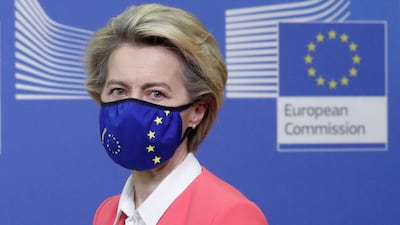Hopes of a Brexit deal breakthrough rose after Britain and the EU agreed to extend talks beyond the December 13 deadline.
Fears of a no-deal Brexit had increased significantly with warnings of empty supermarket shelves, medical shortages and lorry tailbacks at ports as the negotiations seemed to have reached a stalemate.
But after an hour-long call on Sunday morning between British Prime Minister Boris Johnson and Ursula von der Leyen, President of the European Commission, it was decided that talks should continue.
Politicians said that the two sides were “97 per cent of the way there”.
The likelihood of a historic trade and security deal came after a statement was issued on Sunday by Mr Johnson and Ms von der Leyen saying it was responsible to continue discussing the outstanding issues.
“We had a useful phone call this morning,” they said. “We discussed the major unresolved topics.
“Our negotiating teams have been working day and night over recent days.
"And despite the exhaustion after almost a year of negotiations, despite the fact that deadlines have been missed over and over, we think it is responsible at this point to go the extra mile.
“We have accordingly mandated our negotiators to continue the talks and to see whether an agreement can even at this late stage be reached.”
Despite Mr Johnson claiming last week that a no-deal was now “very, very likely”, sources indicated that common ground had been found.
Analysts believe that as long as talks continue there is still a chance of a deal being struck.
There was said to be acknowledgement that an agreement could be reached without either side undercutting the other on their own regulatory standards.
It is likely that talks are approaching the point where there is agreement on EU fishermen having access to British waters and on fair competition rules.
It had previously been reported that Royal Navy Police could be given the power to arrest EU fishermen if they illegally entered Britain’s waters.
Earlier, Ireland's Taoiseach Micheal Martin said it was “in all our interests” to secure a good Brexit deal.
“Even at the 11th hour, in a very difficult negotiation around level playing field and fisheries, the capacity in my view still exists for the UK government and EU and their negotiating teams to conclude a deal that is in all our interests for the longer term,” Mr Martin told the BBC.
Negotiations in Brussels were in progress until midnight on Saturday before resuming at 9am, but hinged on the call between Mr Johnson and Ms Von der Leyden.
After a three-hour dinner on Wednesday in Brussels, the pair said a “firm decision” would need to be made by Sunday if there was any hope of a deal.
There are indications now that a few more days are required to get an agreement over the line before the final deadline of December 31.
If there is no deal by then, UK supermarkets are warning of a shortage of fruit and vegetables for at least three months.
Health ministers are also concerned that certain medicines could run out within six weeks.
Panic-buying by shoppers could also dwarf that seen at the height of the Covid-19 crisis this year.


